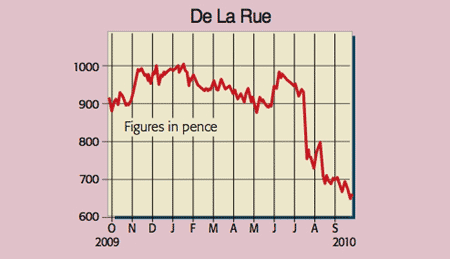
One hedge against hyperinflation is gold. Another is De La Rue, the world’s largest printer of banknotes and other security documents such as passports, traveller’s cheques and government stamps. With central banks printing more and more cash, its currency unit (which accounts for 72% of revenues) has been going ‘gangbusters’.
At least it was until 20 July, when the share price skidded 30% on news that its Overton facility in Hampshire had suffered severe production problems after “some of the company’s employees had deliberately falsified certain quality-control certificates”.
This shocking state of affairs led to the resignation of De La Rue’s chief executive in August, followed by a £35m profit warning in early September. The only saving grace is that it appears to be neither the physical security nor the security features of the notes that have been compromised. The company said that the “shipment of affected banknote paper was immediately stopped and all production is now in line with specifications”.
If this is correct and the issue relates solely to poor quality, then the sharp share price falls present a buying opportunity. Because despite the adverse reaction from affected customers (mooted to be the reserve banks of India and Venezuela), any further fallout should be limited, with the sub-grade notes simply being recalled, pulped and replaced.
Gamble of the week: De La Rue (LSE: DLAR)
In fact, none of the company’s existing clients have thus far raised any official concerns. The Home Office, for which De La Rue is providing the redesigned and security-enhanced UK passports in a ten-year deal worth £400m, says it still has “every confidence” in the group.
The City is forecasting 2010 sales and underlying earnings per share of £544m and 48.1p respectively, rising to £570m and 60.4p in 2011. Assuming a new CEO can be appointed and soon get to grips with the damage caused, then three years down the track from now, I would estimate that De La Rue can knock out earnings of around 80p a share (versus 76p in 2009) and pay a healthy 45p dividend (42.3p), representing a yield of 6.9%. On this basis, using a discount rate of 12% and a 14 times multiple – while adjusting for the proforma net cash of £67m and £92m pension deficit (net of tax) – I would value the stock at around 780p a share. The key risk here is whether the quality issue will result in any long-term harm (eg, contract cancellations). However, given the industry’s high barriers to entry, along with the company’s previous good standing, I doubt it will. Interims are due out on 23 November.
Recommendation: BUY at 661p (market cap £654m)
• Paul Hill also writes a weekly share-tipping newsletter, Precision Guided Investments